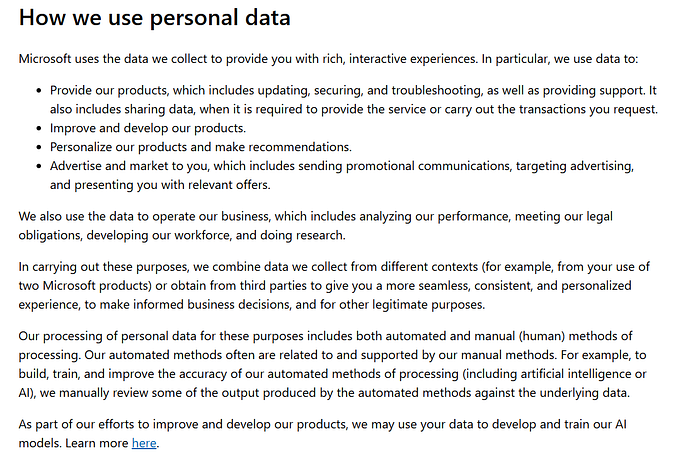Microsoft Office, like many companies in recent months, has slyly turned on an "opt-out" feature that scrapes your Word and Excel documents to train its internal AI systems. This setting is turned on by default, and you have to manually uncheck a box in order to opt out.
If you are a writer who uses MS Word to write any proprietary content (blog posts, novels, or any work you intend to protect with copyright and/or sell), you're going to want to turn this feature off immediately.
How to Turn off Word's AI Access To Your Content
I won't beat around the bush. Microsoft Office doesn't make it easy to opt out of this new AI privacy agreement, as the feature is hidden through a series of popup menus in your settings:
On a Windows computer, follow these steps to turn off "Connected Experiences": File > Options > Trust Center > Trust Center Settings > Privacy Options > Privacy Settings > Optional Connected Experiences > Uncheck box: "Turn on optional connected experiences"

I don't have a Mac computer, but I've seen the following steps shared for how to manage the same system settings on Mac: Word > Preferences > Privacy > Manage Connected Experiences > Uncheck ALL boxes
I want to thank Ilona Andrews for alerting me to the issue and how to fix it from their blog.
Why should I turn off Connected Experiences?
If you read the privacy statements linked on the "Optional Connected Experience" page (which will warn you that you are "losing access to features" by unchecking the box), you will see new language in these agreements that allows Microsoft to use your data in unethical and concerning ways.

The "How we use personal data" section of Microsoft's updated privacy statement (screenshot above), updated in September 2024, reads as follows:
How we use personal data
Microsoft uses the data we collect to provide you with rich, interactive experiences. In particular, we use data to:
- Provide our products, which includes updating, securing, and troubleshooting, as well as providing support. It also includes sharing data, when it is required to provide the service or carry out the transactions you request.
- Improve and develop our products.
- Personalize our products and make recommendations.
- Advertise and market to you, which includes sending promotional communications, targeting advertising, and presenting you with relevant offers.
We also use the data to operate our business, which includes analyzing our performance, meeting our legal obligations, developing our workforce, and doing research.
In carrying out these purposes, we combine data we collect from different contexts (for example, from your use of two Microsoft products) or obtain from third parties to give you a more seamless, consistent, and personalized experience, to make informed business decisions, and for other legitimate purposes.
Our processing of personal data for these purposes includes both automated and manual (human) methods of processing. Our automated methods often are related to and supported by our manual methods. For example, to build, train, and improve the accuracy of our automated methods of processing (including artificial intelligence or AI), we manually review some of the output produced by the automated methods against the underlying data.
As part of our efforts to improve and develop our products, we may use your data to develop and train our AI models. Learn more here.
This privacy statement explicitly states the use of your data to train AI, and their right to share (sell) your data to third parties. This is enabled through the "connected experiences" tab:
Connected experiences that analyze your content are experiences that use your Office content to provide you with design recommendations, editing suggestions, data insights, and similar features.
Here is a list of everything Connected Experiences supposedly does.
Turning off Connected Experiences will lose you access to features such as dictation, text suggestions, transcription, and translation, which use AI. Some non-AI features may also be disabled by unchecking the box, such as remote printing from the Microsoft 365 mobile App, for some reason.
Companies often sneak useful items into the same setting to try to dissuade you from turning it off.
These features are already not available to companies who have licensed Microsoft Office using PowerShell to block content analysis or have Double Key Encryption (DKE) to protect files and emails. Company admins must opt in to AI features, whereas single users have to opt out.
Nefarious.
A few closing thoughts
I'm frustrated that AI-scraping is becoming an "opt out" experience on tons of services that previously had no connection to AI. For example, writers have expressed concerns about NaNoWriMo (National Novel Writing Month) endorsing generative AI and AI-based services (see Priya Sridhar's excellent article below for a summary on what happened):
Whether we ask for it or not, nearly every major company is developing AI-based features and using our data, some of which is proprietary, to train it. You can assume pretty much anything you post on the internet is being used to train AI. But it is particularly alarming that content stored on our own devices is also being targeted.
It is already possible for LLMs (large language models, or what we're mistakenly calling "artificial intelligence") to mimic the style of specific writers on whose content it has been trained. As a writer, I'm starting to get worried about AI-generated content cornering the market on creativity, and forcing real writers out.
As of right now, AI can't "compete" with human writers when it comes to novels, poems, and even short stories. But if we keep feeding it human content on which to learn, it won't be long before it can.
If you're interested in learning more about AI and creative writing, check out these articles:
If you want to read some 100% human-written fiction, check out my three-novel series with JMS Books. Not looking to buy a book right now? Show your support by buying me a coffee, or check out my Science Fiction, Flash Fiction, and LGBTQ Fiction lists on Medium.


